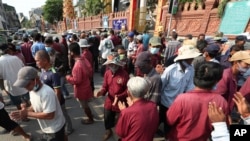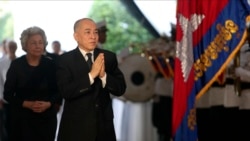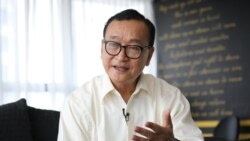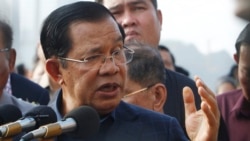The draft “state of emergency” law has received strong criticism from civil society members, human rights defenders, and politicians for the wide-ranging powers it gives to the government with nearly no accountability.
In a copy of the draft leaked late Tuesday, later verified by a Justice Ministry spokesperson, the law aims to give the government sweeping powers during a national emergency, while at the same time curbing a range of fundamental freedoms enshrined in the Constitution.
The newly-proposed law on national emergency would potentially give Cambodian government unlimited access to martial power to enforce an emergency, while vastly controlling the citizenry’s online and offline activities.
The draft also spelled out no defined timeframe or guidelines for how long a declared emergency can last, though on Wednesday a Council of Minister's statement said it would be no longer than three months, but at the same time gave the government leeway to extend it.
San Chey, executive director at the local office of the Affiliated Network for Social Accountability, said he was worried that such an important law would have no sufficient oversight, given that parliament was a one-party body without any opposition parties.
There should have been more consultations to make sure the draft was revised with inputs from other stakeholders, including civil society, academia, the private sector, and legal experts, San Chey added.
“To make sure the content of this law is relevant beyond COVID-19, there is an even stronger need of consultation that needs to take place,” he added.
King Norodom Sihamoni and Queen Mother Norodom Monineath departed for Beijing Wednesday morning leaving Say Chhum, President of the Senate, as the designated head of state, enabling him to sign the legislation as law after it was passed by parliament.
Hun Sen’s Cambodian People’s Party occupies all 125 seats in the National Assembly and 58 out of 62 seats in the Senate, leaving the draft legislation with no obstacles before it is promulgated.
Leng Penglong, secretary-general of the National Assembly, said the lower house would work on the law this week, but he didn’t expect the law to be passed until next week. He added that no parliamentary session had been scheduled as of Wednesday.
Phil Robertson, deputy director of Human Rights Watch’s Asia Division, said the law would equip Prime Minister Hun Sen’s government with unprecedented legal powers since the 1980s.
“This decree is the coup de grace for Cambodian democracy because it marks the complete and final extinguishing of any remaining civil and political liberties,” Phil Robertson said in an email.
“What's truly frightening is this: taking the powers in the decree to their logical extension of absolute control over all aspects of society, economy, and politics, it's fair to say such dictatorial authority has not been seen in Cambodia since the days of Pol Pot.”
Sam Rainsy, opposition leader, and former Cambodia National Rescue Party president said Prime Minister Hun Sen’s government should focus on fighting the epidemic rather than exhausting resources to legislate a new law, which he said could further dismantle civil liberties.
“Hun Sen’s regime can use COVID-19 as a pretext to suppress citizens, overlooking the efforts to find solutions to the other priorities in response to this epidemic,” Sam Rainsy told VOA Khmer during a talk show program on Tuesday.
“But, they choose to set up politically-motivated measures to arrest people, shut down human rights, and silence critics,” he added.
Yang Saing Koma, a senior member of the fledgling Grassroots Democratic Party, said there was no need to include all the restrictive measures in legislation meant to tackle a national emergency under more realistic scenarios.
The law enables declaring of a state of emergency in the case of war, foreign invasion, health crises like pandemics, but also the vaguely-defined scenario of “severe chaos to national security and social order.”
“It is not necessary to include these kinds of conditions, including denying [of] rights and freedoms - banning this and that,” he said.
“There is no need to include those [articles] in the draft, I cannot find the need to do so. What is the real purpose?” Yang Saing Koma said.
Prime Minister Hun Sen said in the parliament on Monday that even though the law would be passed, there had been no decision on whether a state of emergency would be required, given the current coronavirus tally in the country.
A state of emergency would put Cambodia in the company of ASEAN allies, such as the Philippines, Thailand, and Indonesia, which have also enforced national emergencies.
Chin Malin, spokesperson for the Justice Ministry, dismissed any concerns and said the law was only meant to protect “public interest, national security, and social welfare.”
“In any country, vast powers are granted to the executive to take needed and urgent measures to control these situations,” he said.
“If you follow the government’s orders there is no need for concern as it will ensure both your interests and the public interests.”
Violations of the draft law could result in imprisonment for up to 10 years, and, in some cases, result in fines totaling one billion riels, or around $250,000.
In a statement released Wednesday, Hun Sen pledged to donate seven months of his salary to fund the fight against the coronavirus, while also instructing officials to ensure there were sufficient reserves of rice and salt to weather the pandemic.
On Wednesday, the Ministry of Health announced that there were no new cases of the virus and that 25 people had recovered from the respiratory disease so far.










